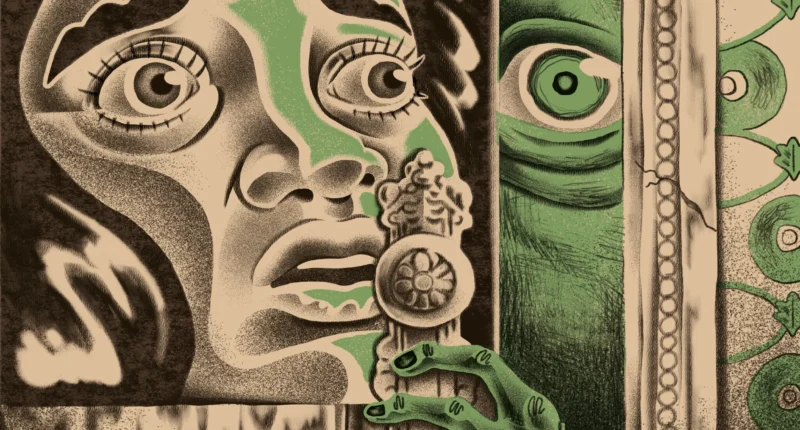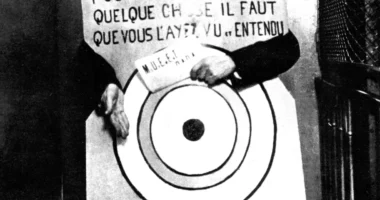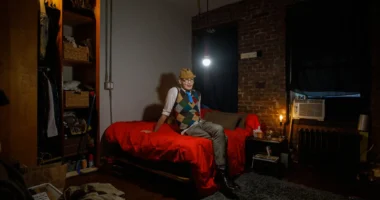Emily Ruth Verona’s MIDNIGHT ON BEACON STREET (Harper Perennial, 195 pp., paperback, $17.99) is a lot of things. It’s a taut thriller about a babysitter and two kids surviving one weird night. It’s a celebration of classic horror movies. It’s a creepy narrative that involves a ghost and late night home break-ins. And, most important, it’s a lot of fun.
The story takes place in October 1993. Eleanor Mazinski has a date, so she calls Amy, her regular babysitter, to look after her two children. Mira, age 12, is defiant and opinionated, and Ben, who’s 6, is sweet and shy. Both are grappling with larger family struggles, including a recent move, Eleanor’s financial stress and their father’s absence after their parents’ split. Amy’s evening with Mira and Ben starts like normal, but a visit from some surprise guests, followed by an unwanted appearance by the children’s father, derails the night, which ends with a body in the kitchen and a lot of blood on the floor.

In “Midnight on Beacon Street,” Verona plays with home invasion tropes by delivering a tale with multiple breaches, each offering differing types of frights. Verona also keeps the spirit of horror present through Amy’s obsession with movies like “Halloween,” “The Texas Chainsaw Massacre” and “The Exorcist.” With its feverish pacing and startling plot twists, this is an impressive debut.
Another great debut is Jenny Kiefer’s THIS WRETCHED VALLEY (Quirk Books, 302 pp., paperback, $18.99), a hallucinatory nightmare of a novel that blends adventure, horror and historical fiction, and isn’t shy about violence or strangeness.
The story follows a geology researcher, his assistant, a rock climber and her boyfriend as they explore a newly discovered cliff face in the Kentucky wilderness. The rock wall could mean good things for everybody’s careers, but what begins as an exciting expedition full of promise soon turns into a desperate race to escape the wilderness and the ancient evil it holds.

The novel opens at the story’s end, as the authorities find three bodies in varying states of decay in the woods. One of them, inexplicably, is just a skeleton with no flesh on it at all. Responders are baffled by the discovery, but the forensic investigation that follows generates more questions than answers. Then the novel jumps to the past to delve into what happened. Kiefer injects so much tension and fear into the story of this group’s mysterious demise that you can’t help getting lost in this creepy tale.
Putting a new spin on a demonic possession narrative is no easy task, but that’s exactly what Christopher Golden has done in THE HOUSE OF LAST RESORT (St. Martin’s Press, 292 pp., $29).
The story follows a young American couple, Tommy and Kate Puglisi, who buy an old house in Becchina, Italy, for a single euro through a special town revitalization initiative. The move seems great — the town is full of flowers and cozy cafes, and it allows them to work from home and enjoy free health care. It also gives Tommy the opportunity to reconnect with his grandparents, who live in Italy, and whom Tommy’s father stopped visiting for reasons that were never clear.

The Puglisis want to help enliven Becchina, and they believe the catacombs under the town might be the perfect tourist attraction to do that. Unfortunately, it isn’t only mummified bodies and bones that lurk in the tombs. The Puglisis learn that their home, which the locals call the House of Last Resort, was used by the Vatican to house possessed people when exorcisms failed to help.
This novel shines. Golden’s frenzied tale of demons and exorcisms is fast-paced, his portrayal of the insidiousness of possession is unsettling and it all comes together in a thrilling closing act.
Tlotlo Tsamaase’s WOMB CITY (Erewhon Books, 405 pp., $28) is a fearless novel that probes ideas of surveillance, misogyny and class.
The story takes place in a technological dystopia in which consciousnesses are regularly downloaded into new bodies. Nelah is an entrepreneur who is married to a man with a good job, and she’s about to become a mother, after her daughter, who is developing in an artificial womb in an expensive government lab, is born. That’s not to say Nelah’s life is perfect: She’s in love with a man who’s not her husband and her business is struggling. Also, she’s not living in her own body, and she’s one of the “microchipped” because her body used to belong to a criminal.

Because Nelah is a microchipped person, the government can see and hear everything she does, and she must regularly pass tests to make sure she’s behaving and won’t commit crimes. When she does eventually violate the law, her life changes, and in the aftermath she’s haunted by the angry ghost of her victim and worried that those she cares about will suffer repercussions.
Despite a few instances of clunky writing and repetition, Tsamaase brilliantly tackles ideas of motherhood and autonomy. The author seamlessly blends a body-hopping ghost story about revenge with a narrative about the importance of memory. It’s such an original first novel, and I’ll be reading whatever comes next.






